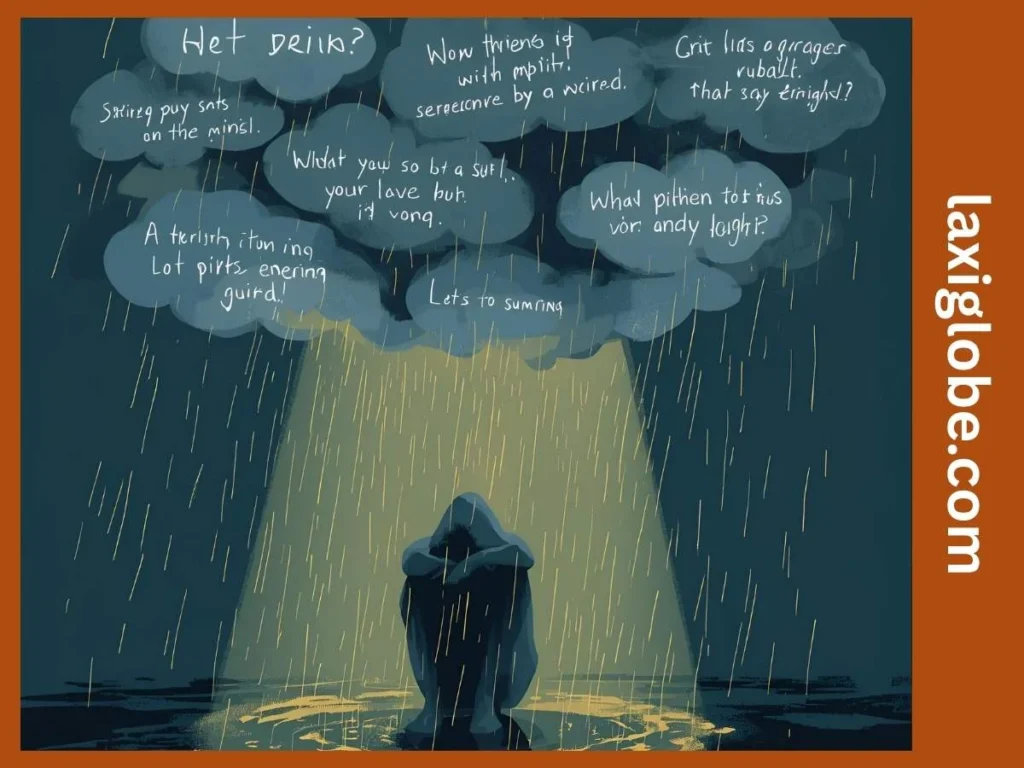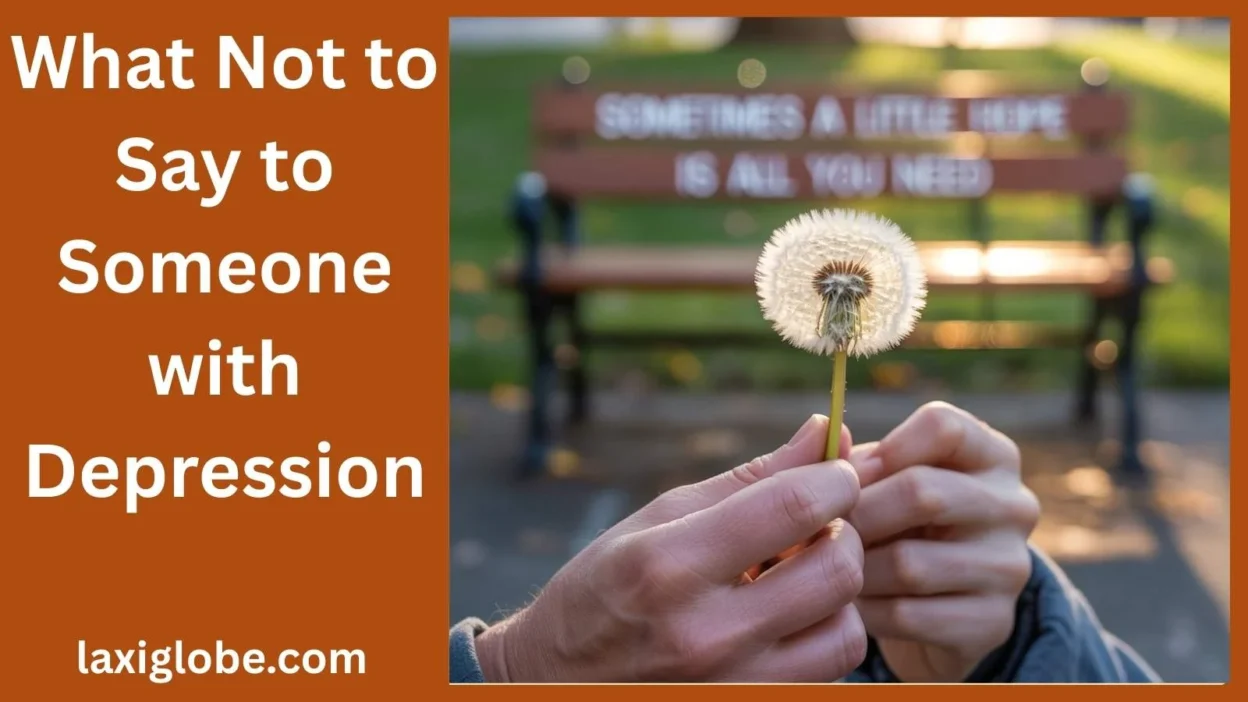Navigating conversations with someone battling depression requires empathy and understanding.
This guide targets friends, family, and loved ones seeking to support without unintentionally causing harm.
By highlighting phrases to avoid, we empower you to foster a safe space for open dialogue.
Depression isn’t a choice or weakness; it’s a serious mental health condition.
Our detailed sections provide alternatives and explanations, helping you communicate compassionately.
From minimizing feelings to offering unsolicited advice, learn what not to say and how to respond thoughtfully instead.
Let’s promote healing through kind words! 🤗
But You’ve Got Everything You Need in Life! 😟

This phrase dismisses the complexity of depression, implying material success should prevent sadness, which ignores chemical imbalances and emotional struggles.
- Dismissing someone’s pain by pointing to their privileges invalidates their experience and makes them feel ungrateful. 😔
- Suggesting external success cures internal turmoil overlooks the neurological aspects of depression. 🤷
- This comment can make the person feel more isolated, as it ignores their emotional reality. 🚫
- It implies depression is a choice, which is harmful and untrue for those suffering. 🙅
- Highlighting what they “have” minimizes their feelings, worsening guilt and shame. 😞
- Such statements pressure the individual to “snap out of it,” ignoring mental health needs. ⏳
- This phrase can strain relationships by showing lack of empathy and understanding. 💔
- It overlooks that depression affects people regardless of life circumstances. 🌍
- Responding this way may discourage them from sharing their struggles openly. 🤐
- Instead of helping, it reinforces the stigma that depression is for the “less fortunate.” 🏷️
Why Are You Always Sad/Depressed? 😢

This question implies depression is a constant state or choice, ignoring its episodic nature and underlying causes.
- Asking this assumes depression is voluntary, which can make the person feel blamed for their condition. 😔
- It oversimplifies a complex mental health issue, ignoring biological and environmental factors. 🤔
- This phrase can make them defensive, as it suggests they enjoy being sad. 🙄
- Repeated questioning may discourage open communication about their feelings. 🤐
- It ignores that depression isn’t “always” present but fluctuates with triggers. 📈
- Such inquiries can heighten feelings of inadequacy and frustration. 😠
- This comment dismisses the validity of their emotions, deepening isolation. 💔
- It implies a quick fix exists, underestimating the need for professional help. 🛠️
- Asking “why” shifts focus from support to analysis, which isn’t helpful. 🔍
- This phrase can perpetuate the myth that depression is just prolonged sadness. 🌧️
I’ve Dealt with Tougher Experiences Than What You’re Going Through 😤

This comparative statement invalidates their pain by suggesting yours is greater, fostering competition instead of empathy.
- Comparing traumas minimizes their struggle, making them feel their pain is insignificant. 😔
- It implies resilience is a contest, ignoring individual coping mechanisms. 🏆
- This phrase can make them withdraw, fearing judgment on their experiences. 🤐
- Dismissing their feelings as “lesser” deepens guilt and self-doubt. 😞
- It overlooks that depression isn’t solely experience-based but multifaceted. 🤷
- Such comments strain relationships by showing lack of compassion. 💔
- This statement discourages sharing, as they fear being outdone in suffering. 🙅
- It perpetuates the idea that only “extreme” pain justifies depression. 📏
- Responding this way shifts focus to your story, not their support. 🔄
- It ignores that everyone’s emotional threshold is unique and valid. 🌟
What to Say and What Not to Say to Someone with Depression 🗣️

Understanding supportive language helps build trust; avoid phrases that dismiss or judge their experience.
- Instead of judgment, offer “I’m here for you” to show unwavering support. 🤗
- Avoid “snap out of it”; say “Take your time, I’m listening” for patience. ⏳
- Don’t say “be positive”; encourage “It’s okay to feel this way.” 😌
- Skip “you have so much to live for”; affirm “Your feelings matter to me.” ❤️
- Refrain from “try harder”; suggest “Let’s find help together.” 👫
- Don’t dismiss with “it’s all in your head”; validate “This is real and hard.” 🧠
- Avoid “others have it worse”; say “Your pain is valid.” 😔
- Skip “cheer up”; offer “What can I do to support you?” ❓
- Don’t say “get over it”; encourage “I’m with you every step.” 🚶
- Refrain from “you’re too sensitive”; affirm “I care about how you feel.” 💕
What to Say When Someone Is Depressed? 💬
Focus on empathetic, non-judgmental phrases that validate their feelings and offer presence.
- I’m here if you want to talk or just sit in silence. 🤗
- Your feelings are valid, and it’s okay to not be okay right now. 😌
- What do you need from me in this moment to feel supported? ❓
- I care about you and want to help however I can. ❤️
- Take all the time you need; I’m not going anywhere. ⏳
- You’re not alone in this; we can face it together. 👫
- It’s brave of you to share how you’re feeling with me. 💪
- Let me know if there’s something specific I can do for you. 🛠️
- I appreciate you trusting me with your emotions. 🙏
- Remember, seeking help is a sign of strength, not weakness. 🌟
How to Support Someone with Depression and Anxiety? 🤝
Provide consistent, patient support by listening, offering help, and encouraging professional care.
- Listen without interrupting, letting them express freely and feel heard. 👂
- Offer practical help like running errands or accompanying to appointments. 🛒
- Encourage self-care routines gently, without pressure or expectations. 🛀
- Remind them of their strengths and past successes to build confidence. 💪
- Check in regularly but respect their space if they need solitude. 📞
- Educate yourself on depression and anxiety to better understand their experience. 📚
- Suggest professional help when appropriate, offering to assist in finding resources. 🩺
- Avoid fixing their problems; focus on being a supportive presence. 🤗
- Celebrate small victories to foster hope and motivation. 🎉
- Be patient, as recovery is nonlinear and requires time. ⏳
How Not to Treat Someone with Depression? ⚠️
Avoid judgment, isolation, or pressure; treat with empathy and respect.
- Don’t ignore their calls or messages, as it deepens their sense of loneliness. 📵
- Avoid forcing social activities when they’re not ready, respecting their energy levels. 🚫
- Refrain from criticizing their coping mechanisms without offering alternatives. 😠
- Don’t share their struggles without permission, maintaining their privacy. 🤐
- Avoid overwhelming them with advice; listen more than you speak. 🗣️
- Don’t expect immediate improvement; understand it’s a gradual process. ⏳
- Refrain from labeling them as “difficult” or “negative.” 🏷️
- Avoid withdrawing support during tough times; consistency is key. 💔
- Don’t compare their progress to others; everyone’s journey is unique. 📏
- Refrain from guilt-tripping them for their symptoms or behaviors. 😞
How to Motivate Someone Who Is Depressed Through Text? 📱
Use encouraging, empathetic texts that validate feelings and offer gentle support.
- Hey, just thinking of you and sending positive vibes your way. 🤗
- You’re stronger than you know; I’m proud of you every day. 💪
- If you need to vent, my phone’s always open for you. 👂
- Remember, small steps count—celebrate today’s wins, no matter how tiny. 🎉
- You’re not alone; I’m here cheering you on from afar. 👫
- Take it one day at a time; you’ve got this. ⏳
- Sending a virtual hug and reminder that I care deeply. ❤️
- What made you smile today? Share if you want. 😊
- Your resilience inspires me; keep going at your pace. 🌟
- If there’s anything I can do, just say the word. 🛠️
Does Depression Make Anxiety Worse? ❓
Depression and anxiety often co-occur, exacerbating each other through shared symptoms like rumination and hopelessness.
- Depression can heighten anxiety by increasing worry about future outcomes. 😟
- Anxiety’s constant stress may deepen depressive episodes and fatigue. 😩
- Both conditions share brain chemistry imbalances, worsening each other. 🧠
- Depression’s isolation can amplify anxiety’s social fears. 🤝
- Anxiety’s restlessness may prevent depression’s needed rest. 🛌
- Shared triggers like trauma can intensify both simultaneously. ⚡
- Depression reduces motivation, making anxiety management harder. 🛡️
- Anxiety’s overthinking can fuel depression’s negative self-talk. 💭
- Co-occurring, they increase risk of severe symptoms like panic. 😱
- Professional treatment addresses both for better outcomes. 🩺
How to Talk to Someone with Depression and Anxiety? 💬
Approach with patience, active listening, and non-judgmental questions to build trust.
- Start with “How are you feeling today?” to open dialogue gently. ❓
- Validate with “That sounds really tough; I’m sorry you’re going through this.” 😔
- Offer “I’m here to listen without judgment whenever you’re ready.” 👂
- Ask “What helps you feel a bit better in moments like this?” 🛠️
- Say “It’s okay if you don’t want to talk; I’m here anyway.” 🤗
- Encourage “Have you considered speaking to a professional about this?” 🩺
- Remind “Your feelings are valid, and you don’t have to face this alone.” ❤️
- Inquire “Is there something specific triggering this right now?” 🔍
- Affirm “You’re doing the best you can, and that’s enough.” 💪
- Suggest “Let’s do something small together if you’re up for it.” 👫
How to Deal with Depression Patient? 🤝
Support a person with depression by being patient, encouraging treatment, and offering practical help.
- Educate yourself on depression to understand their challenges better. 📚
- Encourage professional help without forcing or pressuring them. 🩺
- Offer to accompany them to appointments for moral support. 👫
- Help with daily tasks when energy is low, like cooking or cleaning. 🧹
- Check in regularly but respect their need for space. 📞
- Listen actively without trying to fix everything immediately. 👂
- Promote self-care like exercise or hobbies gently. 🏃
- Avoid judgment; focus on empathy and validation. 🤗
- Celebrate small achievements to build their confidence. 🎉
- Be consistent in your support, as recovery takes time. ⏳
Depression Open Letter 📝
An open letter to someone with depression, offering understanding and encouragement without invalidation.
- I see your struggle and know it’s real and exhausting. 😔
- You don’t have to explain or justify your feelings to me. 🤗
- Your worth isn’t defined by your productivity or mood. 🌟
- I’m committed to supporting you through the ups and downs. 👫
- It’s okay to seek help; it’s a sign of strength. 💪
- Your pain matters, and I’m here to listen anytime. 👂
- Remember, healing is possible, even if it feels distant now. ⏳
- I admire your resilience in facing each day. ❤️
- Let’s take it one step at a time together. 🚶
- You are loved, valued, and not alone in this. 💕
How to Console Someone Who Is Depressed? 🫂
Console by offering presence, validation, and gentle encouragement without trying to “fix” them.
- Sit with them in silence if words fail; presence comforts. 🤗
- Validate “I believe you when you say it’s hard.” 😔
- Offer “I’m sorry you’re hurting; I care about you.” ❤️
- Ask “How can I be here for you right now?” ❓
- Remind “This doesn’t define you; you’re more than this.” 🌟
- Suggest “Would a walk or tea help a little?” 🏞️
- Affirm “It’s okay to cry or feel overwhelmed.” 😢
- Encourage “You’re brave for enduring this every day.” 💪
- Say “I love you and am here no matter what.” 💕
- Follow up “Thinking of you; how are you today?” 📞
Phrases to Avoid When Talking to Someone with Depression 🚫
Certain phrases can invalidate or hurt; choose empathetic alternatives instead.
- Just snap out of it; depression isn’t a switch to flip. 😔
- You’re too sensitive; this dismisses their valid emotions. 🙅
- Think happy thoughts; oversimplifies a complex condition. 🌈
- It’s all in your head; ignores biological factors. 🧠
- Stop being negative; pressure worsens self-blame. 😞
- You have no reason to be depressed; invalidates their pain. 🤷
- Try smiling more; superficial advice ignores root causes. 😊
- You’re bringing everyone down; adds guilt to their burden. 💔
- It’s not that bad; minimizes their personal experience. 📏
- Pray it away; assumes faith alone solves mental health. 🙏
Things Never to Say to Someone with Anxiety 🌀
Avoid phrases that trivialize anxiety; they can heighten stress and isolation.
- Calm down; this invalidates their physiological response. 😠
- It’s not a big deal; minimizes their perceived threats. 🤷
- You’re overreacting; makes them feel irrational or weak. 😞
- Stop worrying; anxiety isn’t easily controlled. 🚫
- Just breathe; oversimplifies a multifaceted condition. 🌬️
- Everyone gets anxious; dismisses severity of their experience. 🌍
- You’re too high-strung; labels them negatively. 🏷️
- Think positive; ignores anxiety’s persistent nature. 🌈
- It’s all in your mind; denies physical symptoms. 🧠
- Relax, it’s fine; pressure can worsen panic. 😌
What Not to Say to Someone Who Is Struggling Mentally ⚠️
Steer clear of dismissive or judgmental comments that can deepen their distress.
- Pull yourself together; implies they choose their struggle. 😔
- You’re attention-seeking; accuses without understanding. 🙄
- It could be worse; compares pain unhelpfully. 📏
- Stop feeling sorry for yourself; adds shame to suffering. 😞
- You’re lazy; confuses symptoms with character flaws. 🛌
- Get a grip; dismisses the need for support. 🙅
- You’re making it up; denies their reality. 🤥
- Everyone has problems; minimizes their unique experience. 🌍
- Just deal with it; lacks empathy for their pain. 💪
- You’re weak; reinforces stigma and self-doubt. 😢
Harmful Things to Say to Someone with Depression 😞
These phrases can exacerbate feelings of guilt, isolation, and hopelessness.
- You’re draining to be around; makes them withdraw further. 💔
- Depression is a sign of weakness; perpetuates harmful stigma. 😔
- You’re choosing to be unhappy; ignores involuntary nature. 🙅
- I don’t have time for this; shows lack of support. ⏳
- You’re overmedicating; judges their treatment choices. 💊
- It’s your fault for not trying; blames the victim. 😠
- You look fine to me; dismisses invisible illness. 👀
- Stop ruining things for everyone; adds immense guilt. 😞
- You’re too much drama; trivializes serious condition. 🎭
- Just exercise more; oversimplifies complex treatment. 🏃
What Not to Say to Someone Going Through Depression 🚫
Avoid comments that pressure or invalidate; they can hinder recovery.
- You’ll get over it eventually; minimizes ongoing struggle. ⏳
- You’re not trying hard enough; implies laziness. 😔
- Depression is just a phase; dismisses chronic potential. 🌑
- I never get depressed; compares unhelpfully. 🤷
- Stop taking meds, they’re bad; endangers health. 💊
- You’re selfish for feeling this way; increases shame. 😞
- Everyone feels blue sometimes; trivializes severity. 🌧️
- Change your attitude; oversimplifies mindset shift. 😠
- You’re bringing me down too; adds relationship strain. 💔
- Just focus on the positive; ignores emotional reality. 🌈
Insensitive Things People Say About Anxiety 😠
These comments can make anxiety sufferers feel misunderstood and alone.
- You’re worrying about nothing; invalidates real fears. 😔
- Anxiety is just an excuse; accuses of faking. 🙄
- Grow a thicker skin; dismisses sensitivity. 🛡️
- Stop being so dramatic; minimizes panic episodes. 🎭
- It’s not real, just imagine it away; denies physiology. 🧠
- You’re too tense all the time; labels negatively. 😞
- Anxiety is for the weak; stigmatizes condition. 💪
- Just chill out already; oversimplifies control. 😌
- Everyone has stress, deal with it; compares unfairly. 🌍
- You’re making it worse by thinking about it; blames victim. 💭
Words That Hurt Someone with Depression and Anxiety 💔
Certain words can deepen pain; choose supportive language instead.
- You’re broken; reinforces feelings of worthlessness. 😔
- Get your act together; implies disorder is choice. 😠
- You’re a burden on us; heightens guilt and isolation. 😞
- Stop overthinking everything; dismisses rumination. 💭
- You’re chaotic for feeling this way; stigmatizes mental health. 🤪
- I can’t handle your issues; withdraws support. 🙅
- You’re weak-minded; attacks self-esteem. 🧠
- It’s your own fault; blames for uncontrollable symptoms. 😔
- Snap out of your funk; minimizes serious condition. ⏳
- You’re too emotional; invalidates natural responses. 😢
What Not to Tell Someone with Depression 🚫
Avoid these to prevent adding to their emotional burden.
- Happiness is a choice; implies they choose suffering. 😔
- You’re lazy for not getting out of bed; confuses symptoms. 🛌
- Stop seeking attention; accuses without basis. 🙄
- It’s all mindset; oversimplifies brain chemistry. 🧠
- You’re ungrateful for your life; increases shame. 😞
- Just pray more; assumes faith solves everything. 🙏
- You’re ruining our plans; prioritizes others over health. 💔
- Get a hobby to distract yourself; trivializes need for treatment. 🎨
- You’re too dependent on meds; judges coping tools. 💊
- Stop complaining; silences their voice. 🤐
Dismissive Phrases to Avoid with Someone Who Has Anxiety 😒
These phrases can make anxiety feel trivialized and unsupported.
- It’s not that serious; minimizes perceived threats. 😔
- You’re making a mountain out of a molehill; dismisses concerns. 🏔️
- Stop freaking out over nothing; invalidates emotions. 😠
- You’re too wound up; labels without helping. 🌀
- It’s just anxiety, ignore it; denies real impact. 🚫
- Everyone worries, get used to it; compares unhelpfully. 🌍
- You’re being irrational; attacks logical thinking. 🤷
- Calm your nerves already; oversimplifies control. 😌
- You’re overanalyzing again; blames for thinking patterns. 💭
- It’s all psychosomatic; doubts physical symptoms. 🧠
Things You Should Never Say to Someone with Mental Health Struggles ⚠️
These comments can harm more than help; opt for empathy.
- You’re chaotic ; stigmatizes and belittles their condition. 🤪
- Pull it together; implies they control their illness. 😔
- It’s attention-seeking behavior; accuses falsely. 🙄
- Stop being so negative; dismisses valid feelings. 😞
- You’re weak for not handling it; attacks resilience. 💪
- I don’t believe in mental illness; denies reality. 🚫
- You’re too sensitive to life; blames personality. 😢
- Get over yourself; minimizes self-care needs. 🙅
- It’s your diet or lifestyle; oversimplifies causes. 🍎
- You’re making excuses; judges coping as laziness. 🤷
How Not to Talk to Someone with Depression and Anxiety? 😶
Avoid condescension, interruption, or advice-giving; focus on listening.
- Don’t lecture on positivity; it feels dismissive. 🌈
- Avoid interrupting their sharing with your stories. 🗣️
- Refrain from offering fixes without being asked. 🛠️
- Don’t question the legitimacy of their feelings. ❓
- Avoid joking about their symptoms lightly. 😂
- Refrain from pressuring for immediate improvement. ⏳
- Don’t compare to your “bad days.” 📏
- Avoid saying they’re too much to handle. 😞
- Refrain from suggesting they “toughen up.” 💪
- Don’t ignore or change the subject abruptly. 🔄
Worst Things to Say to Someone with Depression 😡
These phrases can cause significant harm and setback recovery.
- You’re pathetic for feeling this way; destroys self-esteem. 😔
- Depression is for the weak-minded; stigmatizes severely. 🧠
- Stop wallowing in self-pity; adds shame. 😞
- You’re a failure for not overcoming it; increases despair. 💔
- I can’t be around your negativity; isolates them. 🚫
- You’re choosing misery over happiness; blames victim. 😠
- It’s your karma or fault; moralizes illness. ⚖️
- Stop faking for sympathy; accuses dishonesty. 🤥
- You’re ruining my life too; guilt-trips unfairly. 😣
- Get off your lazy butt; confuses with laziness. 🛌
What Not to Say to Someone Experiencing Anxiety Attacks 😱
During attacks, avoid commands or minimization to prevent escalation.
- Stop panicking; can’t control physiological response. 😠
- It’s not real, just breathe; invalidates experience. 🌬️
- You’re embarrassing me; adds social pressure. 😞
- Snap out of it now; oversimplifies crisis. ⏳
- You’re overreacting again; dismisses triggers. 🙄
- This is annoying; shows lack of compassion. 😒
- Just think happy thoughts; trivializes attack. 🌈
- You’re too dramatic; belittles severe symptoms. 🎭
- I don’t have time for this; withdraws support. 📵
- It’s all in your head; denies physical reality. 🧠
Unhelpful Things People Often Say About Depression 😔
Common unhelpful comments that can hinder rather than help.
- Depression is a mindset issue; ignores biology. 🧠
- You’re too young to be depressed; ageist dismissal. 🌸
- It’s because you’re not active enough; blames lifestyle. 🏃
- Stop dwelling on the past; oversimplifies rumination. ⏳
- You’re smart, figure it out; pressures self-reliance. 🤓
- You need more sun or vitamins; pseudoscience advice. ☀️
- Depression is trendy now; accuses of faking. 📈
- You’re spiritual, pray it away; assumes faith cures. 🙏
- It’s because you don’t appreciate life; guilts them. 😞
Toxic Phrases to Avoid with Someone with Anxiety ☢️
These toxic phrases can worsen anxiety and damage trust.
- Anxiety is your excuse for everything; accuses avoidance. 🙄
- Stop being so needy; dismisses support needs. 😞
- You’re a worrywart, change that; labels negatively. 🏷️
- It’s irritating how you freak out; shows impatience. 😠
- Anxiety is weakness, toughen up; stigmatizes. 💪
- You’re making mountains out of molehills; minimizes. 🏔️
- Stop obsessing over little things; oversimplifies. 💭
- You’re too clingy because of anxiety; blames relationship issues. 🤗
- Get a grip or lose friends; threatens isolation. 💔
What Not to Say to Someone Who Feels Hopeless 😞
Avoid phrases that dismiss hopelessness; they can deepen despair.
- Life’s not that bad; minimizes their perspective. 😔
- Hope is just around the corner; empty platitude. 🌈
- You’re hopeless because you think so; blames mindset. 🧠
- Stop being pessimistic; dismisses valid feelings. 😞
- Others survive worse; compares unhelpfully. 📏
- Find your purpose quickly; pressures discovery. 🔍
- Hopelessness is self-inflicted; victim-blaming. 😠
- Just believe in yourself more; oversimplifies. 💪
- You’re dragging yourself down; adds guilt. 💔
- Tomorrow will be better; assumes without basis. ⏳
Damaging Things to Say to Someone with Depression and Anxiety 😢
These comments can cause lasting harm to mental health.
- You’re a mess, clean up; attacks self-image. 😔
- Depression and anxiety are your faults; blames entirely. 😠
- Stop using it as an excuse; accuses manipulation. 🙄
- You’re toxic to be around; isolates further. ☢️
- Get help or leave; ultimatum threatens. 🚪
- You’re beyond saving; destroys hope. 💔
- Anxiety makes you irrational always; labels permanently. 🧠
- Depression is contagious, stay away; stigmatizes. 😞
- You’re weak for both conditions; doubles shame. 💪
- Fix yourself before talking; conditions support. 🛠️
Examples of What Not to Say to Someone Struggling Mentally 🚫
Real-world examples of hurtful phrases to avoid in conversations.
- Just be happy, it’s easy; oversimplifies emotions. 😔
- You’re chaotic, get over it; stigmatizes and dismisses. 🤪
- I don’t understand your drama; shows lack of empathy. 😒
- Stop complaining about nothing; minimizes struggles. 😞
- You’re attention-seeking again; accuses falsely. 🙄
- Mental health is an excuse; denies validity. 🚫
- Toughen up, life is hard; lacks compassion. 💪
- You’re too emotional for me; withdraws support. 😢
- It’s your karma paying back; moralizes illness. ⚖️
- Get a real problem; compares unfairly. 📏
Don’t Minimize Their Feelings 😔
Minimizing makes them feel invalid; always acknowledge their emotions seriously.
- Saying “it’s not that bad” dismisses their personal pain and perspective. 😔
- “Others have it worse” compares suffering, making theirs seem insignificant. 📏
- “You’re overthinking it” invalidates their thought processes and worries. 💭
- “Just let it go” oversimplifies emotional release in depression. 🙅
- “It’s just a phase” minimizes the chronic nature of mental health. ⏳
- “You’re too sensitive” blames them for normal human responses. 😞
- “Cheer up, smile more” pressures fake positivity over authenticity. 😊
- “Stop dwelling on negatives” ignores rumination in depression. 🌧️
- “It’s all in your head” denies the physical aspects of illness. 🧠
- “You’re making a big deal” trivializes their very real struggles. 🤷
Don’t Dismiss Their Symptoms 😒
Dismissing symptoms can make them doubt their own experience and delay help.
- “You’re just tired” reduces depression to simple fatigue, ignoring depth. 😴
- “It’s hormones or weather” attributes to external factors, not illness. 🌦️
- “You’re imagining the pain” denies the validity of their symptoms. 🤥
- “Everyone feels down sometimes” equates normal moods to clinical depression. 🌍
- “Stop exaggerating your feelings” accuses them of fabrication. 🙄
- “It’s not real, shake it off” dismisses neurological realities. 🚫
- “You’re too dramatic about it” belittles severe emotional distress. 🎭
- “Just eat better or exercise” oversimplifies treatment needs. 🥦
- “It’s attention-seeking behavior” misinterprets cries for help. 😞
- “You’re fine, look normal” ignores invisible nature of mental illness. 👀
Don’t Deny Their Feelings 😔
Denial invalidates their reality, leading to increased isolation and self-doubt.
- “You don’t look depressed” judges by appearance, ignoring internal struggle. 👀
- “You’re not really anxious” denies their self-reported experiences. 😔
- “It’s not as bad as you think” imposes your perspective over theirs. 🤷
- “You’re faking for sympathy” accuses dishonesty, eroding trust. 🤥
- “Depression isn’t real for you” dismisses diagnosis or symptoms. 🚫
- “You’re just moody today” trivializes chronic conditions. 🌧️
- “Anxiety is all mental, control it” ignores physical manifestations. 🧠
- “You seem happy sometimes” uses moments to deny overall illness. 😊
- “It’s not depression, you’re lazy” confuses symptoms with character. 🛌
- “Denying your pain helps no one” reinforces self-doubt in sufferers. 😞
Don’t Compare Their Feelings to Others 📏
Comparisons can make them feel their pain is unworthy or exaggerated.
- “My problems are bigger than yours” creates competition in suffering. 🏆
- “At least you’re not like [person]” minimizes by relative deprivation. 🤷
- “Others cope better than you” implies inadequacy in handling pain. 😔
- “Think of starving children” guilts them for their emotions. 🌍
- “I’ve had worse days” shifts focus to your experiences. 🔄
- “You’re lucky compared to me” dismisses their unique struggles. 🍀
- “People with real issues don’t complain” invalidates their pain. 😞
- “It’s nothing compared to war” exaggerates scale unhelpfully. ⚔️
- “My friend overcame it faster” pressures unrealistic timelines. ⏳
- “You’re better off than most” ignores personal context. 📏
Don’t Express Apathy 😐
Apathy shows lack of care, deepening their sense of isolation.
- “I don’t care how you feel” directly rejects their emotional needs. 😔
- “Whatever, deal with it yourself” withdraws support harshly. 🙅
- “Not my problem to fix” abdicates responsibility in relationships. 🤷
- “I’m tired of hearing this” implies their pain is burdensome. 😩
- “Do what you want, I don’t mind” shows indifference to wellbeing. 😐
- “It’s boring listening to you” belittles their serious concerns. 🥱
- “Figure it out alone” encourages isolation over connection. 🚫
- “I have my own issues” prioritizes self over mutual support. 😞
- “Stop bothering me with this” rejects ongoing dialogue. 😠
- “I’m not interested in your drama” trivializes mental health. 🎭
Don’t Call Them Selfish 🤬
Labeling as selfish adds guilt, as depression often feels self-focused.
- “You’re only thinking about yourself” ignores involuntary introspection. 😔
- “Stop being so self-centered” blames for symptom-driven isolation. 😞
- “Others need you, think of them” guilts for not being “useful.” 👨👩👧
- “Depression makes you selfish” stigmatizes the condition itself. 🏷️
- “You’re ignoring everyone’s needs” heightens shame and withdrawal. 💔
- “Selfish people get depressed” reverses cause and effect harmfully. 🤷
- “Think beyond your pain” demands what depression hinders. 💭
- “You’re selfish for not trying harder” accuses effort as choice. 😠
- “Family suffers because of you” adds relational pressure. 😢
- “Stop wallowing selfishly” dismisses need for self-care. 🛀
Avoid Platitudes 🌈
Platitudes sound empty and dismissive to those in deep pain.
- “Time heals all wounds” offers no immediate comfort or validation. ⏳
- “Everything happens for a reason” implies suffering is deserved. 🤷
- “Look on the bright side” forces positivity over authenticity. 🌞
- “God won’t give you more than you can handle” assumes divine intent. 🙏
- “It is what it is” shows resignation, not empathy. 😐
- “Let go and let God” shifts responsibility to faith alone. 🌟
- “Chin up, buttercup” trivializes with cute language. 😊
- “All’s well that ends well” assumes positive outcome prematurely. 🏁
- “This too shall pass” minimizes current intensity of pain. 🌑
- “Keep calm and carry on” pressures suppression of emotions. 😌
Don’t Ignore Them 📵
Ignoring signals disinterest, worsening feelings of worthlessness.
- Pretending nothing’s wrong denies their need for support. 😔
- Changing the subject abruptly shows discomfort with topic. 🔄
- Not checking in during tough times isolates them further. 📞
- Avoiding eye contact or conversation withdraws emotionally. 👀
- Dismissing texts or calls implies their feelings don’t matter. 📱
- Acting busy to avoid deep talks shows lack of priority. ⏳
- Focusing on superficial topics ignores their pain. 😐
- Not acknowledging shared struggles erodes trust. 🤐
- Withdrawing presence during episodes heightens loneliness. 💔
- Ignoring signs of distress delays necessary intervention. ⚠️
Don’t Shame 😠
Shaming compounds self-loathing common in depression.
- “You should be ashamed of yourself” directly attacks dignity. 😔
- “How can you let this control you?” blames for weakness. 😞
- “You’re disappointing everyone around you” guilts for symptoms. 💔
- “Act normal for once” demands performance over authenticity. 🎭
- “You’re embarrassing with your moods” stigmatizes emotions. 😠
- “Stop being a victim” dismisses real suffering. 🙅
- “You’re pathetic for crying” belittles natural responses. 😢
- “Grow up and handle it” infantilizes adult struggles. 🧒
- “You’re a failure at life” destroys self-esteem. 😔
- “No one wants to be around you” threatens abandonment. 🚫
Don’t Be Apathetic 😐
Apathy conveys uncaring, making them feel unvalued.
- “I don’t really care” directly rejects their emotional needs. 😔
- “Do whatever, it’s your life” shows indifference to wellbeing. 🤷
- “Not my issue to deal with” abdicates supportive role. 🙅
- “I’m bored with your problems” belittles ongoing struggles. 🥱
- “Figure it out yourself” encourages harmful isolation. 🚫
- “I have no opinion on this” withdraws needed input. 😐
- “It’s the same old story” dismisses repetitive nature of illness. ⏳
- “Whatever makes you happy” lacks genuine engagement. 😊
- “I’m neutral on your feelings” shows emotional detachment. 😔
- “Doesn’t affect me, so whatever” prioritizes self over empathy. 💔
Don’t Attribute It to Their Lifestyle 🍎
Attributing depression to lifestyle choices blames the victim unfairly.
- “It’s because you don’t exercise enough” oversimplifies causes. 🏃
- “Eat better and you’ll feel fine” ignores multifaceted nature. 🥦
- “You’re depressed from too much screen time” judges habits. 📱
- “Sleep more and it’ll go away” minimizes sleep disturbances. 🛌
- “Your diet is the problem” blames food for brain chemistry. 🍔
- “Stop stressing over little things” dismisses anxiety triggers. 😞
- “You’re lazy, that’s why” confuses symptoms with cause. 🛋️
- “Drink less coffee, be happier” offers superficial solutions. ☕
- “It’s your job stressing you” overlooks internal factors. 💼
- “Change your routine, fix depression” assumes easy control. 🔄
Don’t Blame 😠
Blaming adds guilt, as they already feel responsible for their condition.
- “It’s your fault for not seeking help sooner” guilts for delays. 😔
- “You brought this on yourself” ignores external factors. 😞
- “Your attitude caused your depression” blames personality. 😠
- “Stop choosing to be miserable” implies voluntary suffering. 🙅
- “You’re to blame for not fighting harder” pressures unrealistically. 💪
- “Your past mistakes led to this” dredges up regret. ⏳
- “You’re weak, that’s the problem” attacks character. 😔
- “Blame your bad habits for anxiety” judges lifestyle. 🍔
- “It’s because you’re not grateful enough” moralizes emotions. 😞
- “You let it get this bad” accuses of negligence. 😠
Don’t Minimize Their Experience 📏
Minimizing makes their struggle feel insignificant and unsupported.
- “It’s not a big deal, move on” dismisses depth of pain. 😔
- “You’re making too much of it” invalidates intensity. 🙄
- “Depression is common, deal with it” normalizes without helping. 🌍
- “It’s just a bad mood” trivializes clinical condition. 🌧️
- “Anxiety is normal stress” equates to everyday worries. 😞
- “You’re fine, stop exaggerating” denies symptoms. 👀
- “Others don’t complain as much” compares unfavorably. 📏
- “It’s temporary, ignore it” minimizes chronic potential. ⏳
- “You’re too focused on negatives” blames perspective. 💭
- “This happens to everyone” dismisses uniqueness. 🤷
Don’t Compare Their Pain 😞
Comparing pain invalidates their unique experience and fosters resentment.
- “My pain is worse than yours” creates hierarchy of suffering. 🏆
- “At least you’re not homeless” minimizes by extreme comparison. 🏠
- “I had depression and got over it” implies they should too. ⏳
- “Think of people in war zones” guilts for “lesser” problems. ⚔️
- “Your anxiety is nothing compared to mine” competes unhelpfully. 😔
- “Others suffer silently, why can’t you?” pressures suppression. 🤐
- “It’s not as bad as cancer” equates mental to physical unfairly. 📏
- “I know real hardship, this is minor” dismisses validity. 😞
- “My friend handles it better” sets unrealistic standards. 👫
- “Count your blessings instead” shifts focus guiltily. 🙏
Don’t Respond With Doubt 🤨
Doubting their experience can make them question their own reality.
- “Are you sure it’s depression?” questions diagnosis validity. ❓
- “It seems like you’re exaggerating” accuses of amplification. 🙄
- “I don’t see any reason for anxiety” imposes your view. 👀
- “Maybe it’s just in your imagination” denies real symptoms. 🤥
- “You don’t act depressed to me” judges by behavior. 😔
- “Anxiety? You seem calm” misses internal turmoil. 😌
- “Prove it’s real depression” demands evidence unhelpfully. 🧾
- “I doubt it’s that severe” minimizes without knowledge. 📏
- “You’re probably misdiagnosed” undermines professional opinion. 🩺
- “It looks like attention-seeking” accuses motives. 😞
Don’t Express Disbelief 😲
Disbelief can erode trust and make them reluctant to share.
- “I can’t believe you’re depressed” denies their self-report. 😔
- “You have no right to feel anxious” invalidates emotions. 🙅
- “Depression? But you’re so successful” ignores hidden struggles. 🌟
- “I don’t buy your anxiety story” accuses of fabrication. 🤥
- “You’re too strong for depression” sets unrealistic expectations. 💪
- “Anxiety doesn’t make sense for you” imposes logic on illness. 🤷
- “I disbelieve it’s real pain” outright rejects their experience. 🚫
- “You seem fine, stop claiming illness” dismisses invisible symptoms. 👀
- “Depression is an excuse, I think” blames for laziness. 😞
- “I doubt your doctor’s diagnosis” undermines medical advice. 🩺
Don’t Oversimplify 🧩
Oversimplifying reduces a complex condition to easy fixes, frustrating them.
- “Just exercise and it’ll go away” ignores comprehensive treatment. 🏃
- “Eat healthy, cure depression” assumes diet solves everything. 🥦
- “Sleep more, anxiety vanishes” minimizes insomnia’s role. 🛌
- “Think positive, end the cycle” overlooks cognitive distortions. 🌈
- “Meditate, fix your mind” suggests quick spiritual solutions. 🧘
- “Drink water, feel better” trivializes hydration over therapy. 💧
- “Go outside, sunshine cures” assumes environment trumps biology. ☀️
- “Read a book, gain perspective” oversimplifies self-help. 📖
- “Laugh more, depression flees” forces joy unnaturally. 😂
- “Change jobs, anxiety gone” blames external without internal focus. 💼
Don’t Tell Them to Try Harder 💪
This implies lack of effort, when depression saps motivation.
- “If you tried harder, you’d be fine” blames for symptoms. 😔
- “Put in more effort to be happy” oversimplifies emotional labor. 😞
- “You’re not trying enough to cope” adds pressure and guilt. 😠
- “Try harder to think positively” ignores negative thought patterns. 🌈
- “Effort will beat anxiety” assumes willpower alone suffices. 💪
- “You’re lazy if not trying” confuses depression with idleness. 🛌
- “Push yourself more daily” risks burnout in low-energy states. ⚡
- “Trying harder fixes everything” dismisses need for professional help. 🛠️
- “Don’t give up, try again” implies they’ve quit prematurely. ⏳
- “Effort is key to recovery” overlooks biological barriers. 🧠
Get Over It 😠
This dismissive phrase implies depression is easily overcome, which it’s not.
- Telling someone to get over it ignores the chronic nature of depression. 😔
- It suggests they’re dwelling unnecessarily, adding shame to their struggle. 😞
- This phrase can make them feel their pain is invalid or exaggerated. 🙅
- “Get over it” dismisses the need for time, therapy, or medication. ⏳
- It implies weakness for not moving on quickly, deepening self-doubt. 💔
- Such comments discourage seeking help, as they trivialize the condition. 🚫
- “Get over it” shows lack of understanding about mental health complexities. 🤷
- It can strain relationships by showing impatience with their process. 😠
- This statement overlooks that recovery is nonlinear and personal. 🔄
- Repeating “get over it” may lead to isolation as they hide feelings. 🤐
It Could Be Worse 📏
Comparing to worse scenarios minimizes their pain without providing comfort.
- Saying it could be worse invalidates their current suffering by relative comparison. 😔
- This phrase implies gratitude should erase depression, fostering guilt. 😞
- It dismisses the uniqueness of their experience with unhelpful hypotheticals. 🤷
- “It could be worse” shifts focus from empathy to perspective forcing. 📏
- Such comments can make them feel ungrateful for their “better” situation. 🙏
- It overlooks that depression persists regardless of external circumstances. 🌍
- This statement discourages expressing feelings, fearing judgment. 🤐
- Repeating it may deepen hopelessness, as it ignores their reality. 😢
- “It could be worse” shows lack of validation for their pain. 🚫
- It can strain support systems by seeming insensitive to struggles. 💔
Count Your Blessings 🙏
This suggests gratitude cures depression, ignoring its complexity.
- Telling to count blessings minimizes depression by implying ingratitude causes it. 😔
- It guilts them for not appreciating life, worsening self-blame. 😞
- This phrase dismisses emotional pain with forced positivity. 🌈
- “Count your blessings” overlooks that depression dulls joy perception. 🙏
- Such advice can make them feel their feelings are unjustified. 🤷
- It implies a simple mindset shift fixes chemical imbalances. 🧠
- Repeating this may discourage sharing, as it feels judgmental. 🤐
- “Count your blessings” shows misunderstanding of mental illness. 😔
- It can isolate them, thinking others don’t grasp their struggle. 💔
- This comment pressures fake gratitude over authentic expression. 😊
I Know How You Feel 🤝
Claiming shared experience can invalidate if not truly comparable.
- Saying I know how you feel assumes identical experiences, minimizing uniqueness. 😔
- It shifts focus to your story, away from their support needs. 🔄
- This phrase can feel patronizing if your “depression” was situational. 🤷
- “I know how you feel” dismisses depth of clinical depression. 🧠
- Such comments may discourage deeper sharing, fearing competition. 🏆
- It implies your coping worked, so theirs should too. 💪
- Repeating this can make them feel misunderstood or alone. 😞
- “I know how you feel” overlooks individual triggers and severity. 📏
- It can strain empathy if perceived as false equivalence. 💔
- This statement risks invalidating their personal journey. 🚫
Think Positive! 🌈
Forcing positivity ignores the cognitive challenges in depression.
- Telling to think positive oversimplifies rewiring negative thought patterns. 😔
- It implies they’re choosing negativity, adding blame and frustration. 😞
- This phrase dismisses the effort required in cognitive therapy. 🧠
- “Think positive” can feel like toxic positivity, invalidating real pain. 🌈
- Such advice pressures masking feelings over processing them. 😊
- It overlooks that depression dulls ability to see positives. 🌑
- Repeating this may lead to resentment toward “happy” people. 😠
- “Think positive” shows lack of understanding for mental blocks. 🤷
- It can isolate them, feeling others don’t grasp their mindset. 💔
- This comment trivializes the need for professional interventions. 🚫
Have You Tried X or Y? 🛠️
Unsolicited advice assumes they haven’t explored options, feeling condescending.
- Asking have you tried yoga implies simple fixes cure depression. 🧘
- It suggests they’re not doing enough, adding self-doubt. 😔
- This phrase overlooks professional treatments they’ve likely tried. 🩺
- “Have you tried dieting?” blames lifestyle for brain chemistry. 🍎
- Such questions can frustrate, as they seek empathy, not solutions. 😞
- It implies your suggestion is novel, undervaluing their efforts. 🤷
- Repeating this shifts conversation from listening to advising. 🔄
- “Have you tried meditation?” oversimplifies complex needs. 🧠
- It can make them defensive about their coping strategies. 🙅
- This comment risks dismissing validated therapies for fads. 🚫
You Should …’ or ‘You Shouldn’t … 😠
Directive language feels controlling, ignoring their autonomy.
- “You should go out more” pressures social activity when drained. 😔
- It implies you know better, undermining their self-knowledge. 🤷
- “You shouldn’t take meds” judges treatment without expertise. 💊
- Such phrases can increase resistance to helpful suggestions. 🙅
- “You should eat healthier” blames diet for mental health. 🍎
- It overlooks that they may lack energy for “shoulds.” ⚡
- Repeating directives feels nagging, straining relationships. 😞
- “You shouldn’t dwell on negatives” dismisses processing needs. 💭
- This language shifts focus from empathy to instruction. 🛠️
- “You should see a therapist” assumes they haven’t considered it. 🩺
Things Could Be So Much Worse 📏
This comparative minimizer dismisses pain by hypothetical scenarios.
- Saying things could be worse implies gratitude should erase suffering. 😔
- It guilts them for not appreciating their “better” situation. 😞
- This phrase compares unhelpfully, making their pain feel invalid. 📏
- “Things could be worse” overlooks that depression amplifies negatives. 🌑
- Such comments can deepen hopelessness by focusing on potential doom. 😢
- It shows lack of empathy for their current emotional state. 🤷
- Repeating this may discourage expressing true feelings. 🤐
- “Things could be worse” trivializes personal context and triggers. 🚫
- It can isolate them, feeling others don’t understand scale. 💔
- This statement assumes relative suffering determines validity. 🌍
But You Were Doing So Well Before! 😕
This highlights past success, implying regression is failure.
- Saying you were doing well before guilts for “backsliding.” 😔
- It overlooks depression’s cyclical nature and triggers. 🔄
- This phrase pressures constant improvement, ignoring setbacks. ⏳
- “But you were better” makes them feel like a disappointment. 😞
- Such comments can discourage sharing relapses fearing judgment. 🤐
- It implies they controlled past wellness, blaming for loss. 😠
- Repeating this focuses on past over present support. 📜
- “You were doing so well” dismisses current struggles’ validity. 🚫
- It can strain relationships by showing frustration with progress. 💔
- This statement assumes linear recovery, not realistic waves. 📈
I’m Not Going to Walk on Eggshells Around You 😤
This defensive phrase implies they’re burdensome, fostering resentment.
- Saying I won’t walk on eggshells accuses them of fragility. 😔
- It shifts blame to their sensitivity over your words. 😠
- This phrase dismisses need for thoughtful communication. 🤷
- “No eggshells” shows unwillingness to adapt supportively. 🚫
- Such comments can make them withdraw to avoid conflict. 🤐
- It implies their condition inconveniences you unfairly. 😞
- Repeating this prioritizes your comfort over their wellbeing. 💔
- “I’m not tiptoeing” rejects empathy in interactions. 😤
- It can escalate tension, worsening anxiety or depression. ⚡
- This statement undermines trust in the relationship. 😔
You Can Recover Without Medication. I Did! 💊
Boasting personal recovery dismisses individual needs and experiences.
- Saying you recovered without meds implies others should too. 😔
- It judges medication as weakness or unnecessary. 💊
- This phrase compares journeys unhelpfully, fostering inadequacy. 📏
- “I did it without meds” overlooks unique brain chemistries. 🧠
- Such comments can discourage seeking prescribed treatments. 🚫
- It assumes your method is universal, ignoring professional advice. 🤷
- Repeating this pressures natural recovery over evidence-based. 😞
- “You can too” sets unrealistic expectations based on anecdote. 🌟
- It can guilt them for “failing” without meds. 💔
- This statement dismisses side effects or severity differences. 📈
Be Grateful for What You Have 🙏
This demands gratitude, implying ingratitude causes depression.
- Telling to be grateful minimizes pain by forcing appreciation. 😔
- It guilts them for not “seeing” their blessings amid darkness. 😞
- This phrase dismisses that depression dulls positive perception. 🌑
- “Be grateful” oversimplifies emotional regulation in illness. 🙏
- Such comments can make them feel selfish for struggling. 😠
- It implies mindset shift alone cures chemical imbalances. 🧠
- Repeating this shifts focus from empathy to moralizing. 🤷
- “Grateful for what you have” compares to “less fortunate.” 📏
- It can deepen shame for not feeling thankful enough. 💔
- This statement trivializes the need for therapeutic interventions. 🚫
Conclusion
Supporting someone with depression requires empathy, patience, and thoughtful communication.
By avoiding phrases that minimize, blame, or dismiss their experiences, you create a safe space for healing.
Remember, depression is a medical condition, not a choice or weakness—your words can either uplift or wound.
Instead, focus on listening, validating feelings, and offering practical help like accompanying to therapy.
Educate yourself on mental health to better understand their struggles.
If you’re unsure what to say, silence with presence is often more powerful than unhelpful words.
Let’s foster compassion to reduce stigma and promote recovery.
Together, we can make a difference! 🤗




